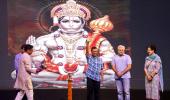'You will see more laws that treat Hindus and non-Hindus, especially Muslims, quite unequally.'
'Once you see this kind of erosion of secularism, it will be very hard to get it back.'

In the India that celebrates 75 years of Independence, a word that was proudly used by the leaders soon after the nation gained freedom from British rule, has become anathema to today's rulers and it is secularism.
Ajay Verghese, assistant professor of political science, Middlebury College in Vermont, USA, whose area of expertise include Indian politics, ethnicity, political violence, historical legacies, religion, and methodology, analyses today's India in this e-mail interview with Rediff.com's Shobha Warrier.
The concluding segment of a two-part interview:
There was a time in independent India when majority of Indians considered religion a private affair. But today, religion is in the forefront with political leaders openly flaunting their religious identity.
How do you look at India's political graph from secularism to Hinduism?
I'm not sure I agree here.
I think that the major religions of India -- Hinduism, Islam, Sikhism, Buddhism, Jainism, etc -- are public religions.
Pradeep Chhibber pointed out that the 2011 Census recorded over 3 million religious structures in the country. Many big temples draw huge throngs of visitors, and religious festivals do the same.
And I think from the beginning of the country, politicians were involved in these religious displays. What's different now is how, as you put it, politicians flaunt their religiosity, and also in how they are more exclusivist and sometimes openly violent in their rhetoric.
What kind of implications will Hinduism and politics getting intertwined, have on Indian society as a whole? Has this link been there earlier, or it began with the rise of the BJP?
Right-wing Hindu political groups have been there since the earliest days of the Republic, but they were not able to beat the Congress machine for many decades.
Now that Hinduism is becoming more and more linked to politics, my guess is that the Indian conception of secularism -- the State keeping a 'principled distance' from religion, as Rajeev Bhargava has argued, and the State treating all religions equally -- will be under assault. And I am very sceptical about whether it will survive.
I think you will see more laws that treat Hindus and non-Hindus, especially Muslims, quite unequally.
The thing is, once you see this kind of erosion of secularism, it will be very hard to get it back.
The BJP all the time talks about one nation-one identity, one nation-one culture, one nation-one language, etc, which of course, the southern part of India strongly opposes. Is there anything called a pan India culture?
I don't think so. But that's one of the things that makes India unique: It has stuck together as one country despite every theory in political science predicting this couldn't work.
In that way it is a great success story.
When the BJP talks about Hindi-Hindu-Hindustan, that doesn't resonate in many southern regions.
And even though the south is Hindu, much of the BJP's imagery, around Ram, for example, doesn't resonate the same way it does in the north.
However, the BJP has been remarkably successful everywhere else in India. So it would be wrong to assume they couldn't, over time, make inroads in the south as well; as one interviewee in Kochi put it to me, "They have nowhere to go but up."
And remember the recent hijab ban that was upheld by courts was in Karnataka, a southern state. So, it's certainly possible the BJP can create Hindu nationalism as their version of pan Indian culture.
From a historical perspective, what happens when minorities are bulldozed and persecuted like it happens in India now?
There are many different possibilities, but none of them are good.
I think on the 'milder' side if you can call it that, you will see Muslims continually treated like second-class citizens under the law.
The worse possibilities are more and more open violence against Muslim communities, especially poorer Muslims.
Over the past few years, it's been vigilantism, lynchings, etc. But now I think the fear is something much less sporadic, much more organised.
You had the Babri mosque demolition in 1992. Would it really surprise anyone if there was another large mosque destroyed in the near future? I don't think so.
Though the BJP came to power with less than 40% vote share, it is said that they enjoy the support of a lot more Hindus because the majority community is happy that the Muslims are taught a lesson by a strong Centre.
Do you agree with this point of view?
The BJP and Modi especially have been very popular, but I don't know if it's because of their treatment of Muslims per se.
The 2014 election was about development and corruption in the Congress. Only in 2019 did we see much more of a focus on identity politics and 'culture war' issues. Modi was the chowkidar.
And again, I would point out that the BJP has faced such little national-level Opposition, so voters have stuck with Modi and his party because who else is there?
That being said, when you have BJP politicians and others in the Hindu nationalist movement starting to glorify violence, normalise it, then this can in turn affect what the public thinks, and definitely turn them against Muslims and distract them from other issues.

Today history is being rewritten saying what we have been learning all these years is the perspective of the Left, and it is essential to learn another perspective.
As a person who has done a lot of studies on Indian history, would you say this allegation is true? Also, what is the right perspective of history?
All historians and historical textbooks have biases, and it's true that many nationalist historians and others in the early decades of the Republic were Marxist in their orientation.
But I don't think it's fair to simply say that this is 'leftist' history.
And that, as a result, what we need now is right-wing, or even Hindutva history.
Take the debate over Aurangzeb, for example. I think he was quite different from his Mughal predecessors in his treatment of and discrimination toward Hindus, and that deserves discussion, but portraying him now as some Islamist tyrant is not correct either.
There is no correct view here, but I think as a general rule history should be told by professionals, and what we see from the BJP now is often very politicised history written by people without professional backgrounds.
Feature Presentation: Aslam Hunani/Rediff.com











 © 2025
© 2025